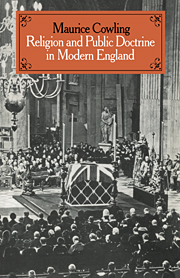Summary
The purpose of this volume has been to establish the existence, and importance, of a field of study. But the volume has also had a hero – a way of thinking which has been pursued with high distinction in England since the third decade of this century and will have many opportunities for displaying a similar distinction in the future.
In spite of Salisbury and other Victorians, this way of thinking is a product of the twentieth century: a reaction to the realization that a post- or anti-Christian doctrine not only exists but has gained the ascendancy at the same time that universal suffrage and universal education have transformed the area of its operation. In mounting a counter-revolution in religion, it has produced a large literature which has left many marks on the public mind.
In some respects these marks have been deep, and will probably be permanent. In others, they have been cosmetic, put on to enable modern men to live modern lives, while avoiding the odium of responsibility for modernity. To one type of mind, cosmetic is repugnant. To others it is essential. We need not judge between them. For it is still the case, whether disguised by cosmetic or not, that modernity is the practice we have and the life we lead, and that we have all to accept it and live as it commands us, even when we despise it.
- Type
- Chapter
- Information
- Religion and Public Doctrine in Modern England , pp. 453 - 454Publisher: Cambridge University PressPrint publication year: 1980

